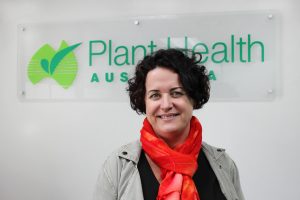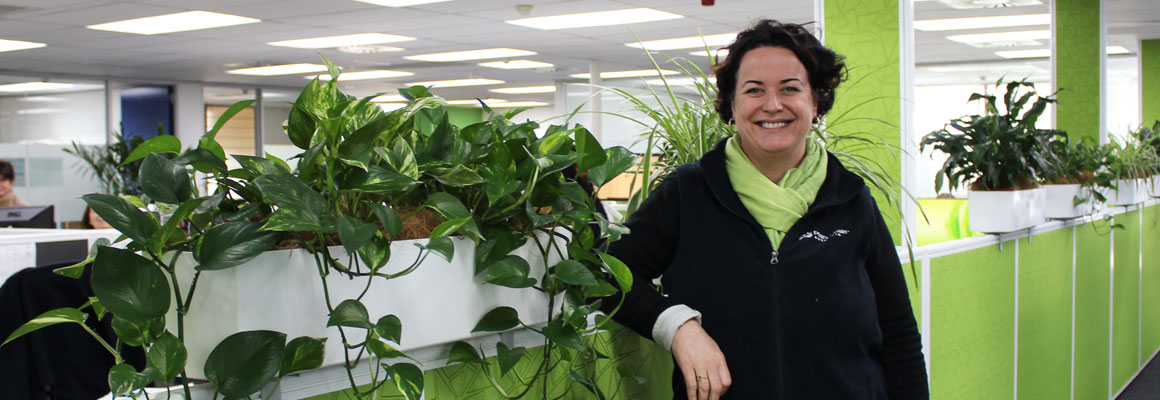Catching up with… Sarah Corcoran
Works at: Plant Health Australia (Chief Executive Officer)
Hi Sarah, thank you for your time today!
Firstly, can you please tell us about Plant Health Australia. What is its role within the horticulture industry?
Plant Health Australia (PHA) brings industry and government together to protect plant health and promote good biosecurity practices to build sustainable agricultural industries. A not-for-profit company, PHA is funded by member subscriptions from all Australian Governments and all major plant industry peak bodies. For over 20 years, PHA has been working to minimise plant pest impacts on Australia, boosting industry productivity and profitability and enhancing market access.
Horticulture is Australia’s second largest and fastest growing industry in agriculture with a farm gate value of approximately $9 billion. Australia’s horticulture industry has been traditionally built on small-scale family farms; however, the industry has grown with larger scale operations emerging to meet market demand. PHA assists farmers to improve biosecurity preparedness by having an on-farm biosecurity plan. Free online publications are also available on the PHA website for farmers to access.
The re-signing of the Plant Biosecurity Research Initiative Agreement (a cross-cutting research initiative across including the Department of Agriculture, Water and the Environment, Plant Health Australia and the seven plant Research and Development Corporations), will also ensure industry and government can continue to work collaboratively to support research efforts that benefit plant health and biosecurity systems as a whole.
You took over the CEO role from Greg Fraser in July this year. What were you doing previously, and how did you get to where you are today?
Prior to taking up this role, I was in the Northern Territory as the Executive Director for Biosecurity and Animal Welfare (BAW). The Territory has always been special to me. I first visited in the mid-1970s when my parents and I drove in our HK Holden ute (I stood on the bench seat in between mum and dad most of the way!) to Alice Springs from Adelaide to visit family. These memories left a lasting impression and it was inevitable the Territory would draw me back during my career.
I became the NT Chief Plant Health Officer in 2016. There were many proud and rewarding moments during my four years in the Territory, including becoming Executive Director for BAW in 2018, delivering proof of freedom on 1 February 2019 for one of the largest plant pest eradication programs ever attempted and achieved in Australia (at $26 million) for the National Banana Freckle Eradication Program; and initiating the emergency response to the detection of Citrus Canker.
My experience as a biosecurity professional extends across the Australian Government, Queensland and Northern Territory state governments and I have delivered a number of significant eradication programs under the Emergency Plant Pest Response Deed and the National Environmental Biosecurity Response Agreement. These experiences have allowed me to implement consistent approaches to biosecurity nationally and have given me the skills and experience crucial to the career path I have taken.
Other career highlights include:
- Initiation of successful training of the world’s first odour detection dogs capable of detecting invasive ant species, Browsing Ant. As a result, they have supported eradication programs in the Northern Territory, Western Australia, and Queensland.
- Being awarded a collaborative Industry/Government Australian Biosecurity Award in 2019, recognising my contribution to maintaining Australia’s biosecurity integrity through the response to citrus canker in the Northern Territory.
- Leading the National Red Imported Fire Ant Eradication Program and delivering successful eradication of fire ants from Yarwun, Gladstone a year and a half earlier than the previous incursion in 2006, setting a new standard in invasive pest management.
I’m very fortunate to now be leading Plant Health Australia, a company that has established itself as a trusted mainstay in Australia’s biosecurity system and is recognised nationally and internationally as leaders in plant health and biosecurity.

Tell us – what do you enjoy most about working in the plant industry and the biosecurity space?
I enjoy the challenges and rewards from protecting plant health and keeping industries viable. Our world changes rapidly, even more so in the past year and we are faced with shifting risks in exposure to the introduction and spread of pests and diseases. To keep one step ahead you have to look outside the square, otherwise these pests and diseases will take advantage and spread uncontrollably. The challenge is always present and one curve ball after another is always thrown. Catching these balls and winning is my ultimate goal.
What do you see as the biggest threat to Australia’s plant biosecurity, particularly for vegetables?
Plant health is of global importance for sustainable agriculture, food security and protection of the natural environment. The biggest threat to vegetables and any other fruit and vegetable product is pests and diseases, and their introduction into farming systems directly or via urban and peri-urban environments where they can take hold and go undetected for many years.
We can’t survive without plants. They need to be protected and nurtured as they feed us, shelter us, clothe us, and sustain all life on earth. They are our livelihoods and when the flag goes up that our plant industries or environment are under threat, we need to work together to achieve the best possible outcome – whether it be through eradication, investment in science to develop better understandings or adapting and assisting in recovery.
It’s also a field of great complexity, requiring lateral thinking and collaboration to solve problems and develop solutions with those that have the experience and knowledge. And that experience and knowledge is held in many locations within industry, government, and community. The best biosecurity outcomes are through partnership, good communication, sacrifice and support, and the plant health community has this in droves.
How can our growers improve their overall biosecurity practices?
By implementing an on-farm biosecurity plan and making sure every step is followed by everyone on the farm, as well as visitors. And being aware of any changes that may occur to the product they are growing and acting swiftly when changes are found and reporting anything of concern.
The Australian vegetable industry is also committed to building its capacity to respond to potential biosecurity threats. A vegetable industry biosecurity advisor, two full-time farm biosecurity officers, and a potato pest surveillance project officer allow the industry to participate in a range of biosecurity initiatives.

What is Plant Health Australia’s main objectives over the next 12 months?
Over the past 20 years, PHA has established exceptional standards for plant biosecurity, and these will continue to be delivered to our stakeholders over the next 12 months. We’re also very mindful that the increasing biosecurity risks are being compounded by other threats such as COVID-19, as well as environmental challenges posed by drought, bushfires and floods. It is essential to ensure investment in plant biosecurity continues to increase and we will also be developing a five-year strategic plan in consultation with industry and government to face future challenges.
My vision is for PHA to be the repository of knowledge for everything plant health within Australia and its territories. With the goal of encompassing government, industry, peak bodies, and the growers themselves, to work together to achieve an integrated national plant biosecurity system.
With this in mind, the next strategic plan will be designed to deliver on priorities for plant health, manage transitions and change, and provide the foundation for long term agricultural, economic, and biosecurity outcomes for Australia.
Where can we find out more about Plant Health Australia and your work?
Our website is user-friendly and contains a variety of information relevant to plant production, maintaining biosecurity awareness, and on-farm practices. And of course, if the information isn’t available or you need to know more, PHA can be contacted and requests will be followed up.
Each week, the Weekly Update will be featuring a member of the vegetable industry. Whether you are a grower, a researcher or work in the supply chain, this is a chance to showcase the different roles and areas within horticulture. If you – or someone you know – would like to be involved, please email Michelle De’Lisle at michelle.delisle@ausveg.com.au.

